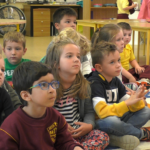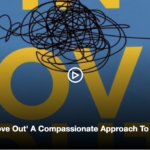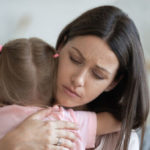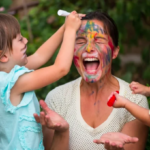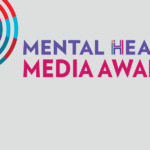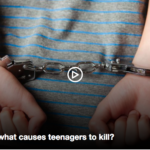Category Archives: Parenting
How can I ease my child’s incessant anxiety about coronavirus?
Published: Irish Examiner
Author: Dr. Malie Coyne
“
Clinical psychologist Dr Malie Coyne, a lecturer at the National University of Ireland Galway and author of Love In Love Out – A Compassionate Approach to Parenting Your Anxious Child , says: “This health crisis has been challenging for many, especially those prone to anxiety.
“My experience as an anxious child, as a parent and as a clinical psychologist, has taught me that parents play a crucial role in containing their child’s anxiety, and in finding the tricky balance between helping them to feel safe and empowering them to test their fears.”
How to show compassion and support for an anxious child
Published: The Irish Times
Author: Sheila Wayman
Interviewee: Dr. Malie Coyne
“Anxiety is both professional and personal for Dr Malie Coyne, a clinical psychologist and self-confessed “little worrier” as a child.
From around the age of eight, she knew there were tensions within the family unit that trailed around the world after her father, a Dutch diplomat, and later ambassador, married to an Irish woman.
“It was just the five of us travelling to all these countries, because you don’t have your cousins, aunties and uncles, and then you are getting to know people all over again.”
She reckons she attended at least nine schools, having started in French education, moving on to the British system and then finishing off her second-level education by doing the International Baccalaureate in South Korea. But it was while she was still of primary-school age that she became aware “all was not okay” at home.”
Dr Malie Coyne’s new book draws on her experiences as a childhood worrier
Published: Irish Independent
Author: Liadan Hynes
Interviewee: Dr. Malie Coyne
“Two minutes into speaking to clinical psychologist Dr Malie Coyne, I’m asking her for advice about my own child. I recount how my six-year-old daughter said to me out of the blue recently, “Mommy, I know the virus kills people,” and describe my panicked attempt to come up with a reassuring answer. “I know it does,” my daughter had replied with a stern look, adding: “You’re going to lie to me.”
Malie’s new book, Love in, Love Out: A Compassionate Approach to Parenting Your Anxious Child, is perfectly timed, given the norms we now live in. In the past few months can anyone claim not to have undergone, at some point, heightened levels of anxiety? Malie’s approach is about supporting your child, while also managing your own emotions.
“I’ve poured everything I have in terms of my own experiences of being an anxious child into it, so it was really emotionally driven. And then working with people every day, and being a parent myself… all of those voices are in there,” she reflects.”
Why you shouldn’t try to be the ‘perfect parent’ – you are already good enough
Published: Irish Independent
Author: Malie Coyne
If your children had one wish for you this coming year, it would be your acceptance that being a ‘good enough’ parent to them is just that… enough. But what does ‘good enough’ parenting mean in reality and how is it better than striving to be the best?
In his book A Good Enough Parent (1987), Bruno Bettelheim stated that ‘Perfection is not within the grasp of ordinary human beings’. And yet somehow in the age we live in, where we seem to hold high expectations for everything we do, including our parenting, many parents feel that there must be a ‘right’ way to parent and (surprise, surprise), most of us are falling short.
In an effort to relieve parents of the pressure many feel to meet their children’s every need and quash a few parenting myths, here are my three pillars of ‘good enough’ parenting:
#31daysofparentalselfcare
Back by popular demand and following the success of last year’s’ #31daysofparentalselfcare challenge, it’s almost time to fill our emotional cups for early 2020.
Beginning on 1st January until 31st January 2020, every day I’ll be sharing something I did to look after myself or a parenting challenge I managed in a ‘good enough’ way. I would so much love you to join me.
To be a calm, loving and empathic parent you need to take good care of yourself. Parental self-care is about recognising our feelings and taking the time we need to restore physical, mental, emotional, spiritual and social balance.
Because children learn their sense of worth from watching you, how AMAZING would it be if they saw you do something for yourself every day no matter how small?
Last year there was a great response with lots of ideas from parents ranging from exercising, spending time with people who fill you up, creativity, relaxation, dropping housework, digital detoxes, even a shower without a child audience!🤣
So from Wednesday 1st January 2020, I would love you to share your self-care snippets from your day using the hashtag #31daysofparentalselfcare on my Dr. Malie Coyne Facebook page https://www.facebook.com/drmaliecoyne or on Twitter or Instagram.
WHO’S IN?!!!
P.S. I would really appreciate you helping me to spread the word by sharing this post so lots of parents can join in the challenge ☕️
I wish you and yours a peaceful and Happy Christmas.
Love, Malie xxx
Strong, on-song and woke but why do Anna and Elsa have to be so skinny?
Published: Irish Independent
Author: Yvonne Hogan
Expert Opinion: Dr. Malie Coyne
“As a mum of two young girls who binged on Frozen, we are eagerly awaiting its sequel. Whilst there has been much discussion about the behavioural characteristics of both Anna and Elsa, who each display strong personalities in their own right, it is a shame that once again we have stick thin figures with unrealistic features, which are not representative of the norm.”
“Anything that children are exposed to at a young age can have an influence on their perception of the world, on their emotional and social development, and on what they perceive as a “desirable” way to look, especially young girls. However, it’s all about the balance between those influences and the influences from their parents. The most importance influencer during childhood is the child’s relationship with their parent. As long as the parent is explaining to their child that the characters they see on screen are not realistic images (nor are they attainable just as Elsa’s magic isn’t!) then this can lessen the impact on their young impressionable brains and allow us all to enjoy the film for what it is.”
My nomination for the Headline Mental Health Media Awards 2019
I am delighted to be nominated for the Headline Mental Health Media Awards, which take place in Dublin on the 4th December 2019.
The awards, which were established more than a decade ago and relaunched this year – recognise excellence in the coverage of mental health issues
I am up against ‘A Lust for Life’ and Michelle Hennessy!
Wish me luck!
Mental Health Content | Online
– ‘Where There’s a Will’, A Lust for Life Podcast
– ‘I lost two sons to suicide – I want people to know it’s okay to have problems’, Michelle Hennessy for TheJournal.ie Podcast
– ‘Are we stressing our children out?’, Dr Malie Coyne for RTE Brainstorm
See the full listing of nominees per category here;
Update –
A win at the @HeadlineIreland Mental Health Media Awards wasn’t to be for my @RTEBrainstorm piece but I’m so delighted for @a_lust_for_life who took it home for their amazing podcast. I met such lovely people and got to dress up and have a day out in the big smoke with my hubbie!
Teens who kill – Newstalk Radio
Following the news that the two boys convicted of the murder of 14-year-old Ana Kriegel were sentenced at the Central Criminal Court yesterday afternoon, I discussed the subject of what drives teens to kill – Newstalk Radio.
See also my article in the Irish Independent (https://drmaliecoyne.ie/when-dark-vulnerabilities-collide-what-drives-teens-to-kill/),
When dark vulnerabilities collide: What drives teens to kill?
Published: Irish Independent
Author: Malie Coyne
“As the Judge delivered his sentence on the two teenagers convicted of murdering Ana Kriegel, we were left with a deeply uncomfortable question: What drives young teenagers to commit violent crimes like homicide on innocent victims? While teen murder is a rare phenomenon, it can and does happen when dark vulnerabilities collide.
Most of us were deeply disturbed when hearing about the loss of such a vibrant young girl with her whole life ahead of her and how she tragically came to her untimely death.
Seeing photos of Ana smiling tugs at my heart, because as a parent I cannot imagine the earth-shattering sense of loss her family must have felt as this trial was played out in the public domain. Their grief lives on forever.”
Read article
The importance of helping your children deal with negative self-talk
Published: The Irish Times
Author: Geraldine Walsh
Expert Opinion: Dr. Malie Coyne
“Because of the way the human mind works, we all speak to ourselves unkindly sometimes, which has huge power over how we feel about ourselves and others and how we make sense of our experiences.”
“A child who engages in a lot of negative self-talk is likely to grow up berating themselves unless they are supported by a caring adult who can help them see their inner beauty.
“Researchers have repeatedly found being self-critical can be harmful to both our emotional and physical health and is linked to everything from depression to anxiety to high blood pressure to dissatisfaction with life. Just like a physical attack sends our brains fight or flight response into overdrive, so does an emotional attack directed at ourselves. It’s like the modern day man’s predator is actually himself. To add insult to injury when we engage in self-criticism not only are we the attacked but we are also the attacker and that is exhausting.”
Read article
Oh brother: Why the royals are growing apart
Published: Irish Independent
Author: Tanya Sweeney
Expert Opinion: Dr. Malie Coyne
“sibling envy in adulthood is a stagnant, secretive emotion that finds its insidious expression in anger and deep resentment. Sibling rivalry extending into adulthood is more likely to happen if it goes unchecked in childhood.”
“Seek help for sibling conflict if it is so severe that it is leading to marital problems or problematic family relationships, or if it creates a real danger of physical harm to any family member,”
“Seek help, too, if it’s damaging to the self-esteem or psychological wellbeing of any family member.”


